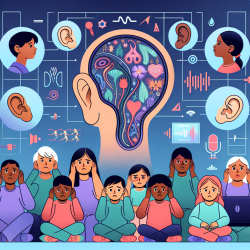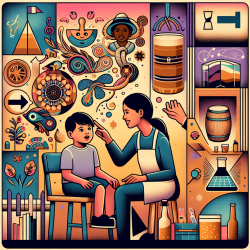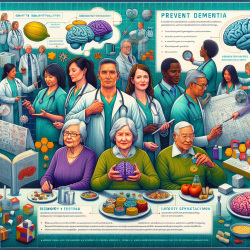Understanding Ideational Praxis in Autism
In the world of speech-language pathology, especially when working with children with Autism Spectrum Disorder (ASD), understanding the multifaceted challenges they face is crucial. One such challenge is ideational praxis, a cognitive skill that involves generating ideas and understanding how to interact with objects and the environment. A recent study titled Influence of Ideational Praxis on the Development of Play and Adaptive Behavior of Children with Autism Spectrum Disorder: A Comparative Analysis sheds light on this important aspect.
The Study at a Glance
This research, conducted by Serrada-Tejeda et al., involved 40 children aged 4 to 6 years, half of whom were diagnosed with ASD. The study utilized the Test of Ideational Praxis (TIP), the Revised Knox Preschool Play Scale (RKPPS), and the Adaptive Behavior Assessment System II (ABAS-II) to evaluate the children's ideational abilities, play skills, and adaptive behaviors.
Key findings revealed significant correlations between ideational praxis and play skills development (r = 0.649; p = 0.01), adaptive leisure behavior (r = 0.338; p = 0.04), and social adaptive behavior (r = 0.319; p = 0.04). These results underscore the importance of ideational praxis in the development of adaptive skills necessary for effective participation in social and leisure activities.
Practical Implications for Practitioners
For practitioners working with children with ASD, these findings highlight several actionable insights:
- Focus on Ideational Skills: Incorporate activities that stimulate ideational thinking, such as imaginative play and problem-solving tasks, to enhance children's ability to generate new ideas.
- Structured Play Interventions: Engage children in structured play sessions that encourage exploration and interaction with various objects, fostering their ability to recognize and utilize object affordances.
- Adaptive Behavior Support: Tailor interventions to improve adaptive leisure and social behaviors, using insights from ideational praxis assessments to guide individualized strategies.
Encouraging Further Research
While this study provides valuable insights, it also opens avenues for further research. Future studies could explore the longitudinal impact of ideational praxis interventions on adaptive behaviors and social skills in children with ASD. Additionally, expanding the sample size and diversity could enhance the generalizability of the findings.
Conclusion
Understanding the role of ideational praxis in the development of play and adaptive behaviors offers a promising path for enhancing the therapeutic approaches for children with ASD. By focusing on ideational skills, practitioners can better support children's social and adaptive development, ultimately leading to more positive outcomes.
To read the original research paper, please follow this link: Influence of Ideational Praxis on the Development of Play and Adaptive Behavior of Children with Autism Spectrum Disorder: A Comparative Analysis.










